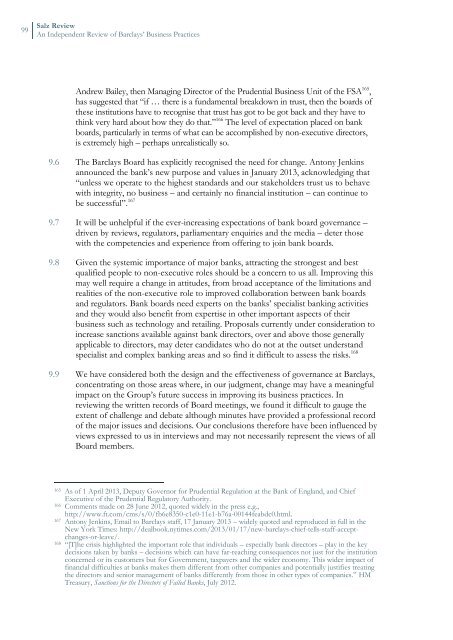Salz Review - Wall Street Journal
Salz Review - Wall Street Journal
Salz Review - Wall Street Journal
Create successful ePaper yourself
Turn your PDF publications into a flip-book with our unique Google optimized e-Paper software.
99<br />
<strong>Salz</strong> <strong>Review</strong><br />
An Independent <strong>Review</strong> of Barclays’ Business Practices<br />
Andrew Bailey, then Managing Director of the Prudential Business Unit of the FSA 165 ,<br />
has suggested that “if … there is a fundamental breakdown in trust, then the boards of<br />
these institutions have to recognise that trust has got to be got back and they have to<br />
think very hard about how they do that.” 166 The level of expectation placed on bank<br />
boards, particularly in terms of what can be accomplished by non-executive directors,<br />
is extremely high – perhaps unrealistically so.<br />
9.6 The Barclays Board has explicitly recognised the need for change. Antony Jenkins<br />
announced the bank’s new purpose and values in January 2013, acknowledging that<br />
“unless we operate to the highest standards and our stakeholders trust us to behave<br />
with integrity, no business – and certainly no financial institution – can continue to<br />
be successful”. 167<br />
9.7 It will be unhelpful if the ever-increasing expectations of bank board governance –<br />
driven by reviews, regulators, parliamentary enquiries and the media – deter those<br />
with the competencies and experience from offering to join bank boards.<br />
9.8 Given the systemic importance of major banks, attracting the strongest and best<br />
qualified people to non-executive roles should be a concern to us all. Improving this<br />
may well require a change in attitudes, from broad acceptance of the limitations and<br />
realities of the non-executive role to improved collaboration between bank boards<br />
and regulators. Bank boards need experts on the banks’ specialist banking activities<br />
and they would also benefit from expertise in other important aspects of their<br />
business such as technology and retailing. Proposals currently under consideration to<br />
increase sanctions available against bank directors, over and above those generally<br />
applicable to directors, may deter candidates who do not at the outset understand<br />
specialist and complex banking areas and so find it difficult to assess the risks. 168<br />
9.9 We have considered both the design and the effectiveness of governance at Barclays,<br />
concentrating on those areas where, in our judgment, change may have a meaningful<br />
impact on the Group’s future success in improving its business practices. In<br />
reviewing the written records of Board meetings, we found it difficult to gauge the<br />
extent of challenge and debate although minutes have provided a professional record<br />
of the major issues and decisions. Our conclusions therefore have been influenced by<br />
views expressed to us in interviews and may not necessarily represent the views of all<br />
Board members.<br />
165 As of 1 April 2013, Deputy Governor for Prudential Regulation at the Bank of England, and Chief<br />
Executive of the Prudential Regulatory Authority.<br />
166 Comments made on 28 June 2012, quoted widely in the press e.g.,<br />
http://www.ft.com/cms/s/0/fb6e8350-c1e0-11e1-b76a-00144feabdc0.html.<br />
167 Antony Jenkins, Email to Barclays staff, 17 January 2013 – widely quoted and reproduced in full in the<br />
New York Times: http://dealbook.nytimes.com/2013/01/17/new-barclays-chief-tells-staff-acceptchanges-or-leave/.<br />
168 “[T]he crisis highlighted the important role that individuals – especially bank directors – play in the key<br />
decisions taken by banks – decisions which can have far-reaching consequences not just for the institution<br />
concerned or its customers but for Government, taxpayers and the wider economy. This wider impact of<br />
financial difficulties at banks makes them different from other companies and potentially justifies treating<br />
the directors and senior management of banks differently from those in other types of companies.” HM<br />
Treasury, Sanctions for the Directors of Failed Banks, July 2012.
















